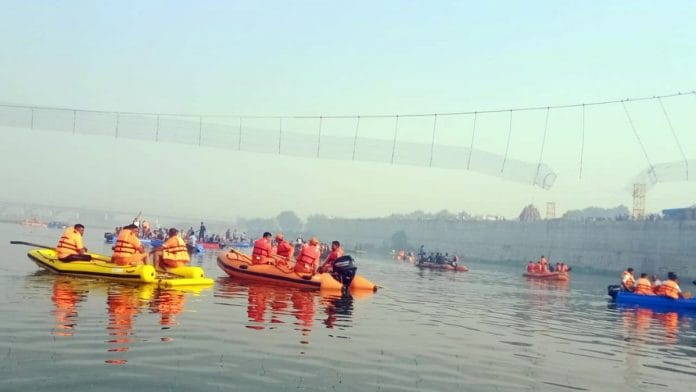The drowning scenes we see in the movies are nowhere similar to those in real life. The risk of drowning is higher in young children, as evidenced by the deaths of 45 and more minor children in the recent collapsing incident of the Morbi Suspension Bridge.
The Morbi district website describes the suspension bridge as an engineering marvel built with the latest technology available in Europe at the time, and it reflects the progressive and scientific nature of Morbi’s ruler Sir Waghji Ravaji, Thakur Sahib of Morvi (1858-1922).
But how does this reference even remotely reflect on how the state is currently functioning, when the bridge was renovated without fair tendering practises and opened for operation without a fitness check? Despite the right to information, no documents pertaining to the tender award or details on the construction vendors are currently available in the public domain.
When the bridge was snapped, it was occupied by hundreds of pedestrians with no crowd control. There was no information about the holding capacity of the bridge mentioned anywhere on a billboard, next to or on to the advertisement banner of the OREVA company, the bridge’s operators.
Also read:
Tourism projects have become a mockery.
People were allowed to walk into the death trap in Morbi without warning, and it appears from the project’s execution that the end users paid a price – a cost of their oblivious enthusiasm. If tourism is a powerful economic engine, the attention should be more on ensuring safety and humane solutions.
The collapse of the bridge has raised several concerns about project preparedness, response action, governance, and the torts in public-private partnerships. The burden of this tragedy rested on no one’s shoulders, as no department or ministry has come forth to accept responsibility for the incident.
The nine accused in the immediate arrest termed the incident as an ‘act of god’ as a defence, claiming that it could not have been caused by human agency but only by physical causes.
Designing projects without planning for the worst is a loss of foresight and perhaps not an ‘act of god’. It is a systematic human action of omission and commission that frequently results in tragedies and the death of innocent people.
The author is a student at Chintamanrao Deshmukh Institute For Administrative Careers. Views are personal






